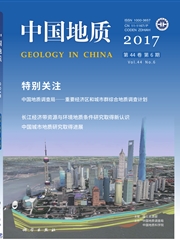

 中文摘要:
中文摘要:
应用LA-ICP-MS U-Pb同位素原位微区定年方法及Hf同位素和微量元素分析方法,对华夏地块北部赣东北地区1个云母石英片岩中48个碎屑锆石进行了系统研究。这些锆石大部分具特征的振荡环带,Th/U比值较高(〉0.4),稀土元素配分型式左倾(富集HREE),具明显正Ce和负Eu异常,属于特征的岩浆锆石。年代学研究显示,华夏北部新元古代变沉积岩主要在-775 Ma出现峰值并在-840 Ma出现次高峰,说明在此时期有两期大规模的岩浆活动。-840 Ma的峰值锆石对应的εHf(t)值明显分为两个区间,既有正值,也有负值,而在-775 Ma的峰值锆石对应测定的εHf(t)值均为负值。结合前人的Hf同位素测试结果,说明华夏地块新元古代中期岩浆活动主要表现为古老陆壳物质的再循环。形成于古元古代-1770 Ma的一个次高峰的年龄数据非常一致,单一的Hf同位素成分和较好的锆石晶形表明它们最可能捕获于深部的一个古元古代基底岩石。
 英文摘要:
英文摘要:
Detailed LA-ICP-MS U-Pb dating and LAM-MC-ICPMS Lu-Hf isotope analysis were carried out for zircons in a mica quartz schist sample from Guixi area of northern Cathaysia Block,South China.These zircons are characterized by zoning,higher Th/U ratios(0.4),HREE enrichment and positive Ce and negative Eu anomalies,and are similar to magmatic zircons in some aspects.Zircon U-Pb geochronological results of the mica quartz schist show a peak at -775 Ma and a secondary peak at -840 Ma,probably corresponding to two large-scale magmatic events.εHf(t) values for the -840 Ma zircons could be divided into two intervals with both negative or positive values,whereas εHf(t) values for the -775 Ma zircons are all negative values.Combined with previous zricon U-Pb dating and Hf isotopic results,the authors conclude that the Neoproterozoic magmatism in the Cathyasia Block mainly found expression in recycling of ancient crustal components.Nine zircon grains from the mica quartz schist with the other secondary peak at around 1770 Ma have very constant U-Pb ages and Hf isotopic composition,implying that they were most probably captured from the Paleoproterozoic basement rock.
 同期刊论文项目
同期刊论文项目
 同项目期刊论文
同项目期刊论文
 Petrogenesis of the Xihuashan granites in southeastern China: Constraints from geochemistry and in-s
Petrogenesis of the Xihuashan granites in southeastern China: Constraints from geochemistry and in-s Ages and geochemistry of Laojunshan granites in southeastern Yunnan, China: implications for W-Sn po
Ages and geochemistry of Laojunshan granites in southeastern Yunnan, China: implications for W-Sn po SHRIMP U-Pb (zircon), Ar-Ar (muscovite) and Re-Os (molybdenite) isotopic dating of the Taoxikeng tun
SHRIMP U-Pb (zircon), Ar-Ar (muscovite) and Re-Os (molybdenite) isotopic dating of the Taoxikeng tun Age and Geochemistry of Granites in Gejiu area, Yunnan province, SW China: Constraints on their petr
Age and Geochemistry of Granites in Gejiu area, Yunnan province, SW China: Constraints on their petr Petrogenesis and geodynamic implications of Gejiu igneous complex in the western Cathaysia block, So
Petrogenesis and geodynamic implications of Gejiu igneous complex in the western Cathaysia block, So Timing of the formation of the Tianhuashan Basin in northern Wuyi as constrained by geochronology of
Timing of the formation of the Tianhuashan Basin in northern Wuyi as constrained by geochronology of Granite, gabbro and mafic microgranular enclaves in the Gejiu area, Yunnan Province, China: a case o
Granite, gabbro and mafic microgranular enclaves in the Gejiu area, Yunnan Province, China: a case o 期刊信息
期刊信息
